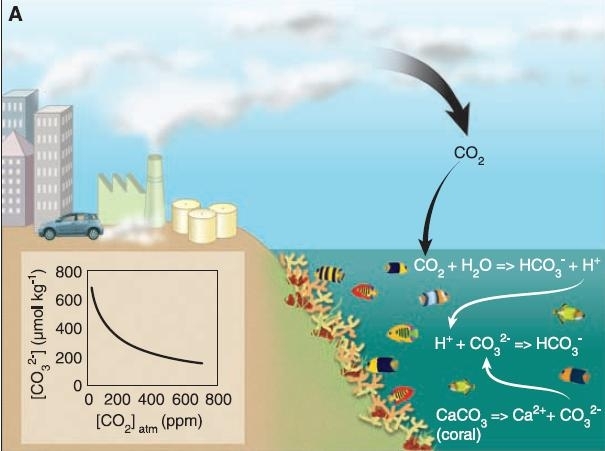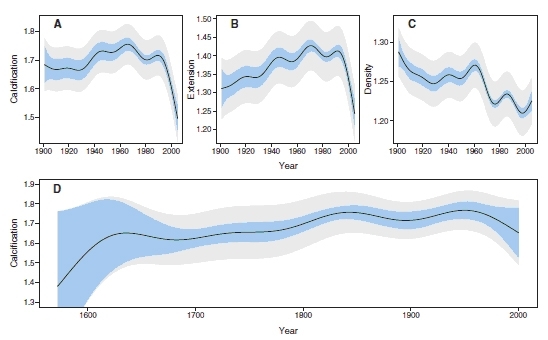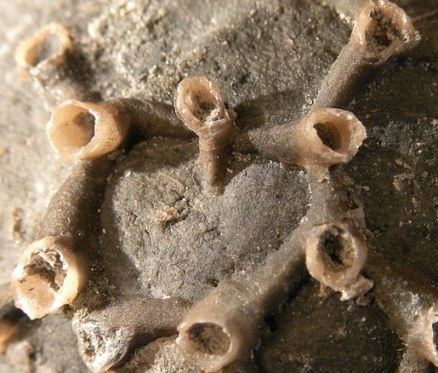Effects of ocean acidification on calcifying organisms
Calcifying organisms, including corals, are predicted to be affected by ocean acidification, or decreasing pH due to increased partial pressures of carbon dioxide (CO2) dissolved in the surface ocean waters (henceforth pCO2) (Fig 1). The resulting changes in carbonate chemistry are predicted to affect many organisms, including reef-building corals, oysters, sea urchins, and planktonic organisms such as coccolithophores and foraminiferans.

Figure 1: Chemical reactions that occur when CO2 is dissolved in the ocean and showing that carbonate ion concentration decreases with increasing CO2 concentration, (Hoegh-Guldberg et al, 2008)
Contents
Larval stage susceptibility
The planktonic larvae and juvenile stages of invertebrates may be more susceptible to environmental changes, including the potential effects of ocean acidification. Organisms in these life stages may be more sensitive to environmental changes; these life stages are also extremely important for recruitment of the next generation and population dynamics, which are important for the recovery of degraded reef systems. Experiments in which sea urchin eggs were fertilized under a variety of pH conditions showed decreasing fertilization rates for low-pH conditions. It is also suggested that high pCO2 levels detrimentally affect larval development of sea urchins and oyster species. Coral polyps of the genus Acropora showed malformed skeletons after larval settlement and metamorphosis after being exposed to high pCO2 conditions for only two weeks. Linear growth rates in juvenile reef-building corals have declined over the past 30 years, which may be related to decreases in oceanic pH.
Coral calcification
Significant decreases in skeletal growth have been measured for many species of corals on the Great Barrier Reef, the world’s largest reef, over the last 10 years. Reproductive success of some coral species could be affected if growth is slowed. Changing ocean temperatures have also been shown to have detrimental effects on coral calcification and reef health in general. In some previous studies, it may be difficult to separate declines in coral health and calcification due to ocean acidification from declines due to other factors.

Figure 2: Calcification, extension and density have declined on the Great Barrier Reef over the past 100 years, (De’ath et al, 2009)
Ecological effects
On coral reefs, ocean acidification could eventually cause the breakdown of the biogenic habitats the reefs form. One report predicts the future state of coral reefs under an emissions scenario of 500 parts per million as “rapidly eroding rubble banks” when future ocean acidification causes dissolution to become greater than accretion rates of reef carbonates. Decline of coral reefs will have serious consequences for regional economies due to loss of tourism, fisheries, and coastal protection. Reef coral responses to reduced calcification include a decrease in linear extension rate and skeletal density and devoting greater energy toward calcification at the expense of other essential processes. Reduced skeletal density of corals can make them more vulnerable to erosion, storm damage, and dissolution. If calcification is reduced and the carbonate formed is more vulnerable to dissolution then coral reef habitats are at risk.
Many species of fish and invertebrates are dependent on coral reefs for habitat and food. These species will surely be affected if reefs continue their decline.
Further reading
- Coral reef scientists blog about current events and new research, including global warming and other effects of ocean acidification.
- Biology of early life state of tropical reef corals. Encyclopedia of Earth.
- Patterns of Caribbean coral loss. Encyclopedia of Earth.
- De’ath, G, JM Lough and KE Fabricius. 2009. Declining coral calcification on the Great Barrier Reef. Science 323:116-119.
- Edmunds, P.J., 2007. Evidence for a decadal-scale decline in the growth rates of juvenile scleractinian corals. Marine Ecology Progress Series 341: 1-13.
- Hoegh-Guldberg O, Mumby PJ, Hooten AJ, Steneck RS, Greenfield P, Gomez E, Harvell CD, Sale PF, Edwards AJ, Caldeira K, Knowlton N, Eakin CM, Iglesias-Prieto R, Muthiga N, Bradbury RH, Dubi A, Hatziolos ME. 2007. Coral reefs under rapid climate change and ocean acidification. Science 318: 1737-1742
- Kleypas JA, Feely RA, Fabry VJ, Langdon C, Sabine CL & Robbins LL. 2006. Impacts of ocean acidification on coral reefs and other marine calcifiers: a guide for future research. 88 p. Boulder, Colorado: Institute for the Study of Society and Environment (ISSE) of the University Corporation for Atmospheric Research (UCAR). <http://www.ucar.edu/communications/Final_acidification.pdf>
- Kurihara, H. 2008. Effects of CO2-driven ocean acidification on the early developmental stages of invertebrates. Marine Ecology Progress Series 373: 275-284
